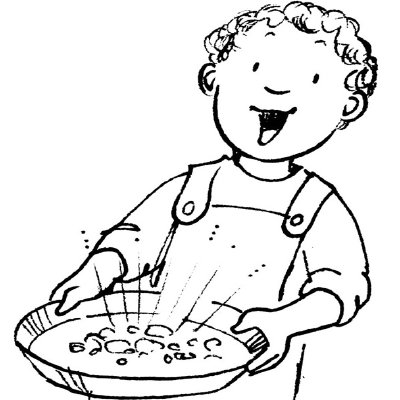
noun
- a broad, shallow container of metal, usually having sides flaring outward toward the top, used in various forms for frying, baking, washing, etc.
- any similar receptacle or part, as the scales of a balance.
- the amount a pan holds or can hold; panful: a pan of shelled peas.
- any of various open or closed containers used in industrial or mechanical processes.
- a container in which silver ores are ground and amalgamated.
- a container in which gold or other heavy, valuable metals are separated from gravel or other substances by agitation with water.
- a drifting piece of flat, thin ice, as formed on a shore or bay.
- a natural depression in the ground, as one containing water, mud, or mineral salts.
- a similar depression made artificially, as for evaporating salt water to make salt.
- (in old guns) the depressed part of the lock, holding the priming.
- Also panning. an unfavorable review, critique, or appraisal: The show got one rave and three pans.
- Slang. the face.
verb (used with object), panned, pan·ning.
- Informal. to criticize severely, as in a review of a play.
- to wash (gravel, sand, etc.) in a pan to separate gold or other heavy valuable metal.
- to cook (oysters, clams, etc.) in a pan.
verb (used without object), panned, pan·ning.
- to wash gravel, sand, etc., in a pan in seeking gold or the like.
- to yield gold or the like, as gravel washed in a pan.
Verb Phrases
- pan out, Informal. to turn out, especially successfully: The couple’s reconciliation just didn’t pan out.
verb
- (intr, adverb) informal to work out; turn out; result
noun
- Greek myth the god of fields, woods, shepherds, and flocks, represented as a man with a goat’s legs, horns, and earsRelated adjectives: Pandean, Panic
noun
-
- a wide metal vessel used in cooking
- (in combination)saucepan
- Also called: panful the amount such a vessel will hold
- any of various similar vessels used esp in industry, as for boiling liquids
- a dish used by prospectors, esp gold prospectors, for separating a valuable mineral from the gravel or earth containing it by washing and agitating
- either of the two dishlike receptacles on a balance
- Also called: lavatory pan British the bowl of a lavatory
-
- a natural or artificial depression in the ground where salt can be obtained by the evaporation of brine
- a natural depression containing water or mud
- Caribbean the indented top from an oil drum used as the treble drum in a steel band
- See hardpan, brainpan
- a small ice floe
- a slang word for face (def. 1a)
- a small cavity containing priming powder in the locks of old guns
- a hard substratum of soil
- short for pan loaf
verb pans, panning or panned
- (when tr, often foll by off or out) to wash (gravel) in a pan to separate particles of (valuable minerals) from it
- (intr often foll by out) (of gravel) to yield valuable minerals by this process
- (tr) informal to criticize harshlythe critics panned his new play
verb pans, panning or panned
- to move (a film camera) or (of a film camera) to be moved so as to follow a moving object or obtain a panoramic effect
noun
-
- the act of panning
- (as modifier)a pan shot
noun
- the leaf of the betel tree
- a preparation of this leaf which is chewed, together with betel nuts and lime, in India and the East Indies
n.Old English panne, earlier ponne (Mercian) “pan,” from West Germanic *panna “pan” (cf. Old Norse panna, Old Frisian panne, Middle Dutch panne, Dutch pan, Old Low German panna, Old High German phanna, German pfanne), probably an early borrowing (4c. or 5c.) from Vulgar Latin *patna, from Latin patina “shallow pan, dish, stewpan,” from Greek patane “plate, dish,” from PIE *pet-ano-, from root *pete- “to spread” (see pace (n.)). Irish panna probably is from English, and Lithuanian pana is from German. Used of pan-shaped parts of mechanical apparatus from c.1590; hence flash in the pan, a figurative use from early firearms, where a pan held the priming (and the gunpowder might “flash,” but no shot ensue). To go out of the (frying) pan into the fire is first found in Spenser (1596). v.2“follow with a camera,” 1913 shortening of panoramic in panoramic camera (1878). Meaning “to swing from one object to another in a scene” is from 1931. Related: Panned; panning. Arcadian shepherd god with upper body of a man and horns and lower part like a goat, late 14c., a god of the woods and fields, from Latin, from Greek Pan. Klein says perhaps cognate with Sanskrit pusan, a Vedic god, guardian and multiplier of cattle and other human possessions, literally “nourisher.” Similarity to pan “all” (see pan-) led to his being regarded as a personification of nature. Pan-pipe, upon which he supposedly played, is attested from 1820. v.1“to wash gravel or sand in a pan in search of gold,” 1839, from pan (n.); thus to pan out “turn out, succeed” (1868) is a figurative use of this (literal sense from 1849). The meaning “criticize severely” is from 1911, probably from the notion in contemporary slang expressions such as on the pan “under reprimand or criticism” (1923). Related: Panned; panning. The Greek god of flocks, forests, meadows, and shepherds. He had the horns and feet of a goat. Pan frolicked about the landscape, playing delightful tunes. Turn out well, succeed, as in If I don’t pan out as a musician, I can always go back to school. This expression alludes to washing gold from gravel in a pan. [Mid-1800s] In addition to the idiom beginning with pan
also see:
 Liberal Dictionary English Dictionary
Liberal Dictionary English Dictionary